If you have a dream to reach the top of Search Engine and remain there in 2025
You need to focus on following Google’s SEO guidelines.
It’s important to optimize both your on-page content and off-page elements.
There are several useful tools for on-page SEO that can help you reach your goals.
Let’s start with the basics first.
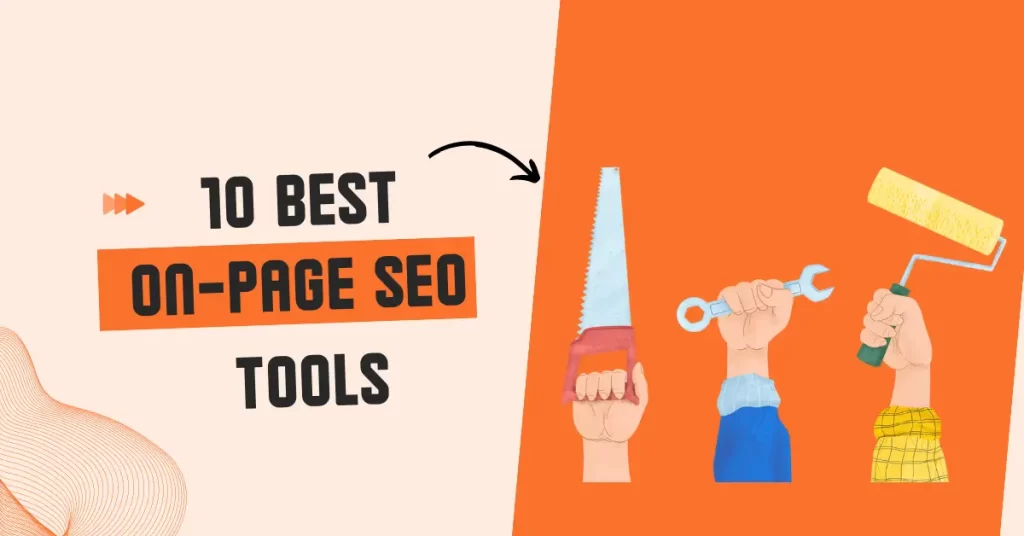
What is On-Page SEO?
Ever wonder how some websites always seem to land on the first page of Google?
The secret sauce is On-Page SEO. In simple terms, On-Page SEO is all about optimizing your individual web pages so search engines like Google can easily understand what they’re about.
Think of it like giving Google a roadmap that says, “Here’s exactly what this page covers!”
When you break it down, it means making sure that everything on your page content, images, URLs, and even the behind-the-scenes code works together to give both users and search engines a top-notch experience.
Key Elements of On-Page SEO
Let’s talk about the core elements of On-Page SEO.
Nailing these will give your page the best chance of ranking.
Title Tags: This is the first thing users see in search results and on their browser tab.
A clear, concise, and keyword-optimized title helps both search engines and users quickly understand what your page is about.
Meta Descriptions: These little snippets under your title in search results give users a preview of what’s on your page.
Writing a compelling meta description that hooks people in can seriously boost your click-through rate.
Headers (H1, H2, etc.): Think of headers as the outline of your content. They organize your page into sections and make it easier for both users and search engines to digest.
Content: High-quality content that answers the questions your audience is asking, filled with relevant keywords, is a must.
Internal Links: Linking to other pages on your site is great for user experience and SEO. It helps Google crawl your site better, and it keeps users on your site longer.
Image Alt Text: Search engines can’t “see” your images. Alt text describes what’s in the image, which helps them understand and rank your page more effectively.
Page Load Speed: No one likes a slow website. The faster your site loads, the better your chances of ranking high (and keeping users around).
Why is On-Page SEO Important?
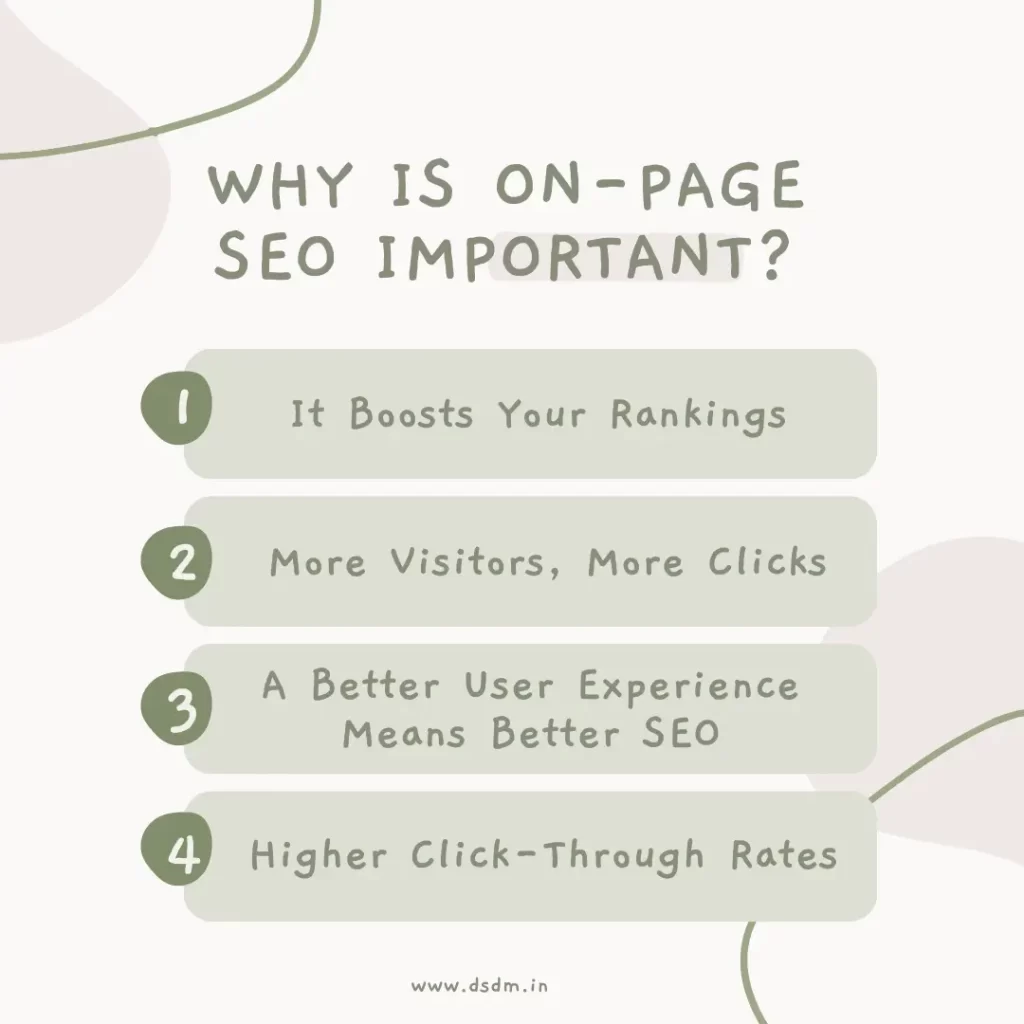
Why should you bother with On-Page SEO?
Well, it’s not just a good idea it’s critical if you want to rank well and bring in more traffic. Here’s why:
1. It Boosts Your Rankings
Search engines love a well-organized, optimized page.
When Google knows exactly what your page is about, it’s more likely to rank it higher.
Think of it like handing in a perfectly organized report to your boss you’re more likely to get that promotion.
2. More Visitors, More Clicks
The higher your site ranks, the more people will see it.
When your page is optimized for the right keywords and runs smoothly, you’ll see more visitors, plain and simple.
3. A Better User Experience Means Better SEO
On-Page SEO isn’t just for search engines—it’s also for the people visiting your site.
If your content is easy to read, your site loads quickly, and everything works seamlessly, users will stick around longer.
Google notices this, and your rankings improve as a result.
4. Higher Click-Through Rates
A killer title tag and meta description can make your link stand out in search results, drawing more clicks and driving more traffic to your site.
On-Page SEO is the foundation of your website’s performance in search engines.
It’s the part of SEO that you have full control over, from optimizing your content to ensuring your technical setup is spot-on.
By using On-Page SEO tools, you can make the process faster, easier, and more effective. Let’s talk about popular on-page SEO tools.
10 Best On Page Optimization Tools
1. Yoast SEO (for WordPress)
If you run a WordPress site, Yoast SEO is the plugin you need.
It’s hands down one of the most popular tools out there, offering everything from optimizing your meta tags to creating XML sitemaps.
Plus, it helps make your content more readable, which is key for both users and search engines.
Features:
On-Page SEO Recommendations: Real-time feedback on keyword density, meta descriptions, and readability, so you can fine-tune your content on the go.
Schema.org Markup Support: Helps search engines understand your content better through structured data.
XML Sitemap Creation: Automatically generates sitemaps to help search engines crawl your site more efficiently.
Usage: Yoast SEO is your on-page SEO assistant. It analyzes your content and gives you suggestions to improve it, making sure your posts are optimized to rank.
2. Google Search Console (Google Webmaster Tool)
Google Search Console is an absolute must-have if you’re serious about SEO.
It’s a free tool straight from Google that gives you a clear look at how your site is performing in the search results.
You get insights into how Google is indexing your site, allowing you to monitor performance and troubleshoot issues.
Features:
Performance Report: Tracks key metrics like CTR, impressions, and clicks to show how your pages are doing in Google.
Coverage Issues & Mobile Usability: Identify problems with how Google indexes your site and see if there are mobile-friendly issues to fix.
URL Inspection Tool: A go-to for troubleshooting individual page issues or checking how a specific URL is performing.
Usage: If you want to know how well your site ranks on Google, this tool is essential.
Plus, it helps you quickly fix indexing errors that could be holding your site back.
3. Letter Count Tool
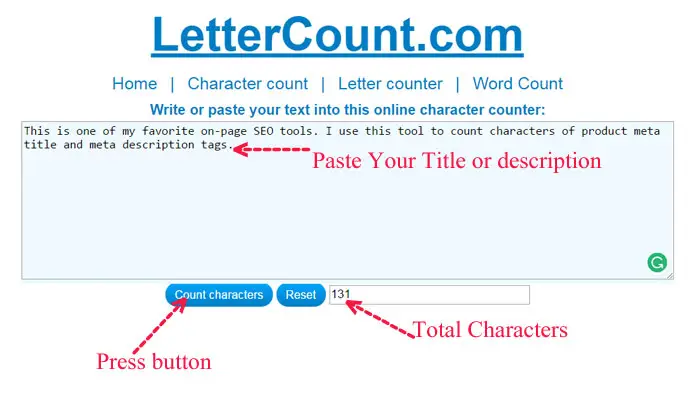
This is one of my favorite on-page SEO tools.
I use this tool to count characters of product meta titles and meta description tags.
It shows the total number of characters of your meta title which you had made for the particular product.
3.Copyscape Plagiarism Checker Tool
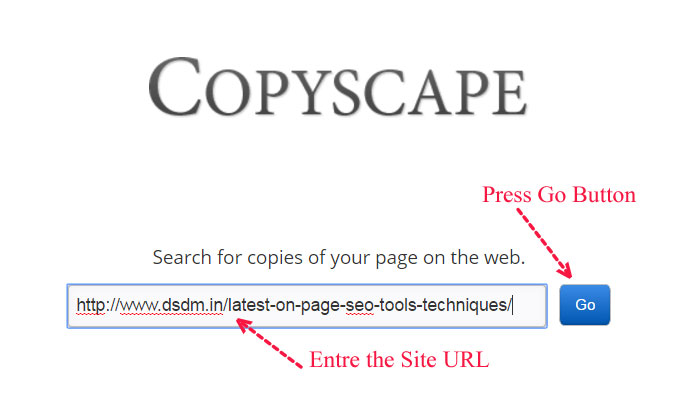
CopyScape best tool to check plagiarism. As per Google SEO guidelines your content should be fresh and unique.
This tool helps you to check your website content quality.
I use Copyscape premium version to find duplicate content of site pages and fix them.
4. Free Grammar Checker - Grammarly
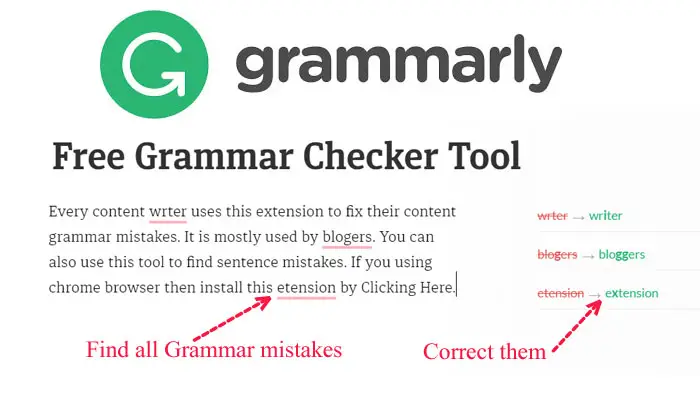
Every content writer uses this extension to fix their content grammar mistakes. It is mostly used by bloggers and content marketers, Who want to write their on page blogs or guest posting without grammatical mistakes.
It is also known as Online Proofreading & Grammar Checker Tool.
You can also use this tool to find sentence mistakes, spelling mistakes, style and punctuation. If you are using chrome browser then install this extension by Clicking Here.
5. LSI Graph
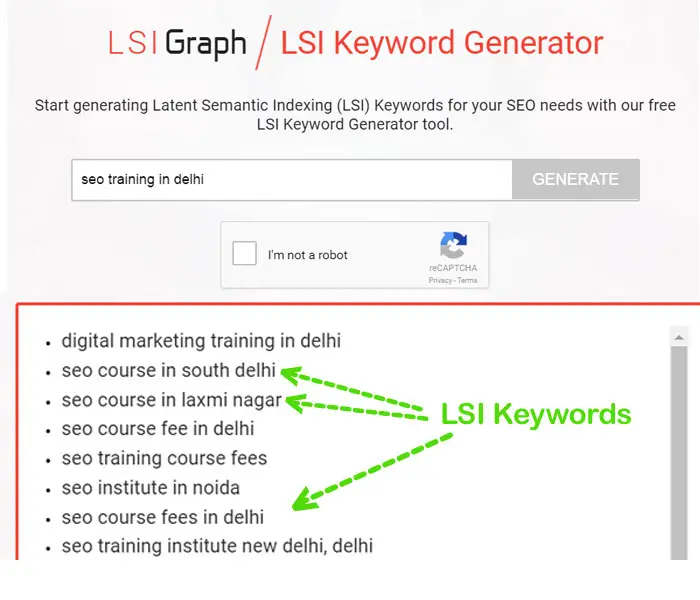
LSI Graph is my favorite tools for SEO on page optimization, both tools help us to find LSI Keyword terms to optimize page content.
LSI Keywords protects your page content from spam & keyword stuffing. You can use these tools in a simple way.
Step1: Go to LSI Graph Site
Step 2: Enter your target keyword: ” SEO Training in Delhi “
Step 3: Enter Captcha code and then hit ” Generate Button “
Step 4: Now You can see all related and LSI keyword terms
6. Sitemap Generator
This tool helps you to create Free Sitemap.xml file For Google, Yahoo, MSN, and Bing in simple ways.
Through the XML protocol, All search engines could track the Site URLs more efficiently, Hence, your site will index faster and frequently.
Enter your site details generate Sitemap.xml file in 5 minutes.
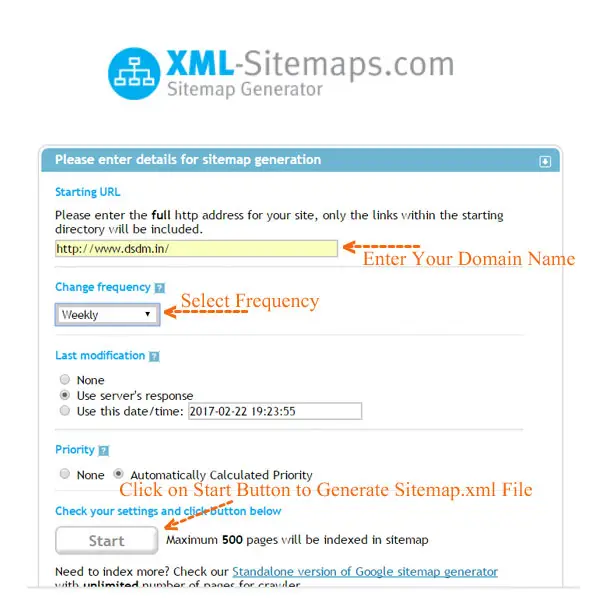
7. WordCounter Plus
If you like to count your article words in a simple way, then you can use this extension, Simply highlight the webpage text, then press right click on it and select the \”WordCounterPlus\” menu.
It will tell you the total number of characters and words with longest & average word length. You can use this extension to count the total number of words of your competitor blog as well
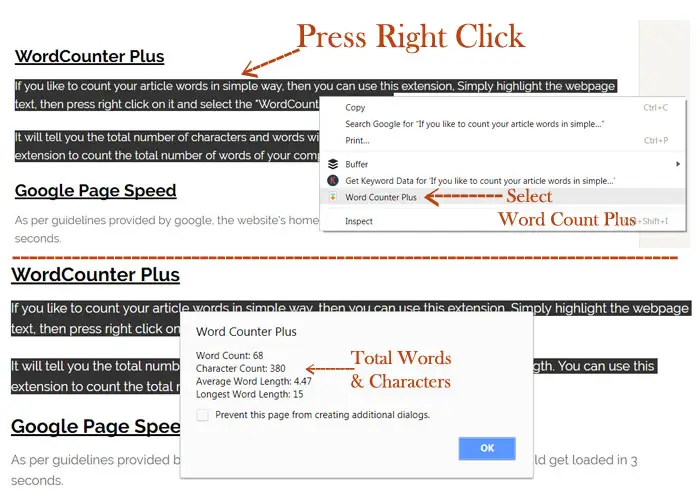
8. CloudConvert.com
When it comes to converting images, CloudConvert is my go-to tool.
I frequently use it to convert PNG and JPG images to WebP format, and it never disappoints.
Why do I love this tool? It’s straightforward and incredibly efficient. WebP images are smaller in size without sacrificing quality, which means faster loading times for my website.
9. Google PageSpeed Insights

Description: PageSpeed Insights is another must-use tool from Google, designed to analyze the speed and overall performance of your webpages.
It checks how your site performs on both mobile and desktop, giving you key insights into what’s slowing things down and how to fix it.
Features:
Performance Score: Instantly get a score based on how well your page performs, along with actionable suggestions to improve it.
Core Web Vitals Metrics: Tracks important metrics like LCP (Largest Contentful Paint), FID (First Input Delay), and CLS (Cumulative Layout Shift) all critical for ranking and user experience.
Usage: PageSpeed Insights is essential if you want to boost both your user experience and your SEO. Faster pages mean happier visitors and better rankings.
10. Pixabay.com
If you are looking for free commercial use images for your website or blogs.
Then I recommend you for Pixabay.com. It has over 880000 high-quality HD pictures, vector graphics, and illustrations.
There is no attribution required for the use of photos. Simply search with keyword and download it to your computer. I personally use this site for my own projects.
I hope the tools mentioned above help you boost your on-page SEO and improve your blog’s ranking on Google search results. If you’re interested in diving deeper into SEO strategies, check out my Advanced SEO Course.
What are your favorite on-page tools for search engine optimization?
